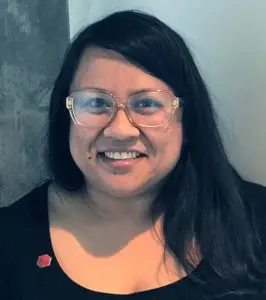“This is a very loaded question for someone who makes her living off loving films and TV shows–it’s akin to asking a parent which child they love the most,” says Sherrie Gulmahamad. The question I asked her was, of course, “What’s your favorite movie?” The question is more loaded for her because Gulmahamad is an originals creative analyst at Netflix. She’s also known by a more colloquial title: Netflix tagger.
Taggers are a 30-person strong team at the streaming giant whose job it is to watch Netflix content and “tag” each film and episode with relevant metadata. That metadata directly affects every show and movie you choose to watch. In part, it’s the objective information about the content, like release year, language, director, and cast lists, or how much profanity or sex is in a film. But taggers are also responsible for labeling all of Netflix’s content with tags that are more subjective–tags that, as Gulmahamad says, “speaks more to the soul of a title.”

It’s tags like the above that Gulmahamad and her team apply that directly affect the (sometimes zany) rows of grouped movies and TV shows you see in the Netflix app. These are rows with titles like “Sci-Fi Thrillers About Technology Gone Wrong,” which are designed to pique users interest and help with content discoverability.
Gulmahamad does most of her tagging work from Netflix’s new headquarters in Hollywood, California, so she can be around her team of like-minded film buffs. Yet she notes that, just as you can watch Netflix from virtually anywhere, the company is open to letting their taggers work from flexible locations. As part of her workload, Gulmahamad tags the content live as she watches it. Her specialty is comedy and stand-up comedy, “with some sci-fi thrown in,” but she notes that Netflix sometimes assigns her content she normally wouldn’t watch. “I was dreading a nine-hour-long Belgian psychological TV series, but I ended up savoring it from beginning to end,” she says.
Following Her Bliss
As cool as Gulmahamad’s job sounds, it’s not the career her parents envisioned for her: They were intent on steering her toward a career in medicine. Gulmahamad had other plans. In the 1990s, she worked in a video store, which only nurtured her love of film. It’s that love, along with Joseph Campbell’s “follow your bliss” advice, that spurred her to go to film school. She studied screenwriting at Loyola Marymount University before going on to complete a graduate degree in critical film studies at UCLA.
After grad school, Gulmahamad bounced around between office jobs before sitting down to identify which companies outside the high-pressure Hollywood studio system would appreciate her passion for film. “Netflix came along like my Cinderella slipper–here was a company that would value my knowledge and offer me a stable, supportive working environment,” she says. “I’ve been here since 2006, when we were just a plucky underdog DVD delivery company.”
Despite the fact that Netflix was much smaller then didn’t mean Gulmahamad was any less intimidated by the interview process. “I remember being very nervous before my interviews, but in the end, they were chatty and informal, and my supervisor at the time was focused on making sure I had a genuine passion for categorizing movies and TV,” she says. “I believe I was quizzed just to make sure my film and TV knowledge had some breadth to it beyond a top 10 ‘listicle’ sensibility.”
How You Can Get Paid To Watch Netflix
Today, Gulmahamad is on the other side of the table. As a senior member of her team, she’s now an integral part of the rigorous interview process. And that process has changed. “Nowadays, candidates are given a writing exercise to gauge their depth of knowledge and test their tagging and curation skills,” she says.
As for how to get a job like hers, Gulmahamad suggests getting into an archival or library studies program on a campus where there is also a film program. “Our job is very much like being a librarian and making sure things are classified accurately, but you also have the broad knowledge base of how TV shows or movies are related, and if they look good together in a row on our site,” she says. “Netflix looks for someone who has both skill sets, plus a passion for innovation. We are always looking for new ways to highlight our originals content, and that means helping other teams brainstorm ideas on how the user interface on the site could change, or how to improve our recommendations algorithms, or create new tags.”
But Gulmahamad notes that the job isn’t always like a Hollywood fantasy. She spends up to 20 hours a week watching content, some of which isn’t always to her interest. “One-hour stand-up specials go by pretty quickly, but I’ve also been assigned a 60-hour Colombian crime drama about Pablo Escobar’s hitman,” she says. “No, I did not have to watch all of it–but I tried!”
That amount of screen viewing can take its toll on the body. “My eyes need a rest, too,” she says, and notes she often gets out of the city to go camping. “I find getting away from any and all screens for an entire weekend is a good reset button.” And then there is the fretting she does over the ratings applied to the titles she watches, and the monotony of adding the “skip credits” button on all those TV shows. But all in all, she knows how lucky she is that she actually gets paid to watch Netflix. As Gulmahamad says, “Even when I am watching really long pieces of content, it always blows my mind that this is actually my job.”
Recognize your brand’s excellence by applying to this year’s Brands That Matter Awards before the early-rate deadline, May 3.
